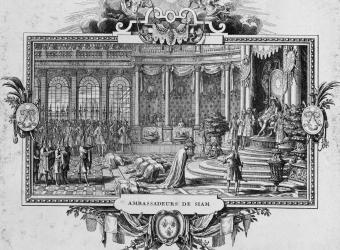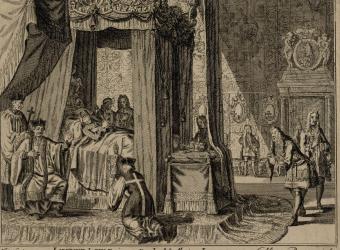This event was a political and diplomatic turning point in the reign of King Louis XIII and the first major event in the history of France to take place at Versailles. The Day of the Dupes – which in fact took place over two days – brought Marie de’ Medici and Cardinal Richelieu head to head. Contrary to what everyone expected, it was the cardinal who triumphed.
Day of the Dupes, 1630 10 and 11 November 1630
The dispute was sparked in Paris in Marie de’ Medici’s Luxembourg Palace on 10 November and ended in Louis XIII’s small Versailles palace the following day. In September 1630, the king’s mother had taken advantage of the serious illness which had almost killed her son to demand the head of her rival, Cardinal Richelieu. Growing increasingly less tolerant of the minister’s influence over how the king ran the country, she meant, with the support of devoted followers, to bring down the person that she had, after all, elevated to power.
ANECDOTE
Marie de Médici left definitively for exile where she continued to plot against the Cardinal until she died in poverty in 1642.
Backed by the Cardinal’s enemies, and in particular those opposed to his foreign policy (Europe was embroiled in the Thirty Years’ War at the time), the former queen began the intrigue on 10 November. Confronted with his mother’s remonstrances, Louis XIII, who wanted to reconcile her with his minister, agreed to remove Richelieu as Superintendant over the house of Marie de’ Medici and the house of all the members of her family. Arriving at Luxembourg Palace on 11 November to submit his resignation to the former queen, however, the Cardinal knocked on doors that stayed shut. Marie de’ Medici had succeeded in persuading the king to dismiss Richelieu as First Minister, but the latter was not prepared to go away quietly. Entering through a hidden door, he interrupted the two of them in their chamber. Louis XIII was disconcerted by the sudden appearance of Richelieu, while his mother flew into a rage against the minister she hated. She demanded that the king, who was pale and speechless with confusion, choose between her and a “valet”. Given confidence by her son’s consternation, Marie de’ Medici believed she had triumphed over Richelieu, who in turn thought he would have to resign. On reflection, however, Louis XIII realised he could not do without the Cardinal, and was not long in choosing between his filial loyalty and the interests of the State. He knew, after all, how much he owed the Cardinal.
Having left Marie de’ Medici convinced that she had won, that same evening the king summoned the Cardinal to Versailles. After a long private conversation, he agreed to reinstate the minister – and to let his mother go. Marie de’ Medici was ordered to leave Paris for Compiègne, and Louis XIII never saw her again. After escaping Compiègne, Marie de’ Medici left for exile where she continued to plot against the Cardinal until she died, in poverty, in 1642.
Richelieu's enemies had been grossly deceived. It was Guillaume Bautru, the Count of Serrant, known for his wit, who, on seeing the royal carriage returning to Paris with triumphant Richelieu aboard, made the comment that gave the affair its name: “It’s the day of the dupes!”












